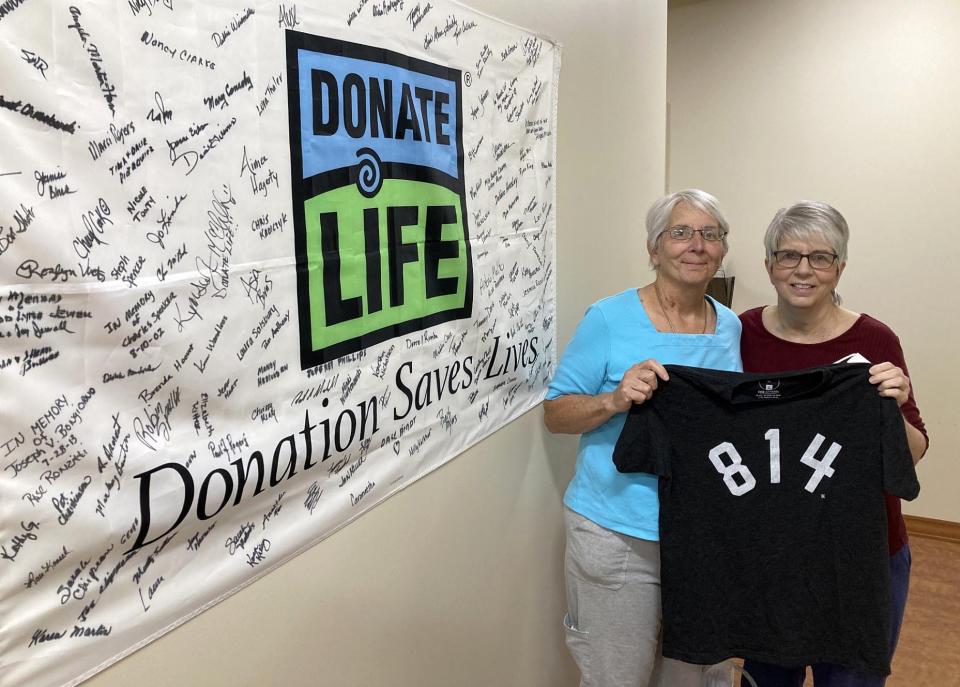West County sisters receive new kidneys in twist on same-day surgery at UPMC Hamot
Cathy Podgers' plan for the day her sister underwent kidney transplant surgery at UPMC Hamot was to make meals for the family and perhaps be available to drive them somewhere.
Instead, Podgers was in a nearby Hamot operating room, getting a new kidney of her own.
Podgers, 70, and Judy Lascak, 72, both received kidney transplants Aug. 14, the first siblings to undergo transplant surgery on the same day since Hamot started performing the surgeries in 2015. They were Hamot's 99th and 100th kidney transplants.
"My transplant had been planned for a while," said Lascak, who lives in Girard Township. "My daughter gave me one of her kidneys."

Three days before Lascak's surgery, Podgers received a phone call from Hamot's transplant coordinator. A donor kidney was available.
"They said the surgery would be (Aug. 14)," said Podgers, who lives in Lake City. "I asked if I could do it a different day because I wanted to support my sister. They said no."
"If Cathy had refused the kidney and she later suffered a stroke or heart attack, she might not have been eligible for a future transplant," said her brother, Chuck Frey. "I'm glad she went ahead with it."
Podgers and Lascak aren't the first siblings in their family to undergo kidney transplant surgery. Frey, 73, received a new kidney in 2021 and their sister, Sarah Murphy, received a new one in 2006.
It's not a coincidence. All four Frey siblings have polycystic kidney disease, a genetic disorder that causes fluid-filled cysts to grow inside a person's kidneys.
Two of their other four siblings also have PKD but do not yet need a kidney transplant. Their father, Jim Frey, died from the complications of PKD in 1996 when he was 70.
"Unfortunately, there is no cure for this disease," said Dr. Rajesh Govindasamy, director of UPMC Hamot's kidney transplant unit. "There is a medication that has been available for the past five years that slows its progression ... but eventually the patient ends up with terminal renal failure, and needs dialysis and a transplant."
Neither Lascak nor Podgers needed dialysis by the time of their transplants. Lascak's surgery had been planned for a while, though even Lascak didn't know about those plans at first.
Her daughter, Julie Bird, had started to undergo the required testing for anyone who wants to donate a kidney.
"She surprised me with it," Lascak said. "Julie called me and said that she had started the process, and that she was a match."
On the day of the transplants, Podgers, Lascak and Bird all gathered in Hamot's pre-operative area to wish each other well before the surgeries.
It dawned on them just how unusual it was to have same-day transplants.
"I couldn't believe it was happening," Lascak said.
"We just joked and laughed about how unbelievable it was," Podgers said. "I didn't even know I was getting a kidney just a few days earlier."
New kidneys worked immediately after surgery
Podgers and Lascak recovered from their surgeries in separate intensive care unit rooms a few yards apart. They texted each other, and waved when the other sister went on an escorted walk down the hallway.
Lascak recovered a bit more slowly than her sister as she had to deal with gas bubbles in her kidneys.
"Judy was worried about her breathing," Podgers said. "But I said, 'Don't worry, I'm just as out of breath as you are.'"
Podgers' and Lascak's new kidneys worked almost immediately after surgery and they were discharged within a week. Bird was sent home after just a couple of days, as donors usually recover more quickly.
Both sisters are returning to normal lives and, in fact, are able to enjoy things they couldn't before the transplants, since their new kidneys are not susceptible to PKD.
"I had a baked potato," Podgers said. "I mean, I had them before but I was supposed to limit them, and soak them in water to get the potassium out of it. People with kidney failure have to limit their potassium."
"I can have potatoes, tomatoes, bananas, broccoli ..." Lascak said.
Sisters' prognosis is good, according to kidney doctor
The only issue the sisters could face is that people with PKD also can get cysts in their spleen and liver, Govindasamy said.
"But the cysts don't grow quickly in those organs like they can in the kidney," Govindasamy said. "Their prognosis is really good."
Family members, who have led local chapters of the PKD Foundation, said they hope to bring more awareness to the disease.
"It's important to get tested, especially if PKD runs in your family," Frey said. "I got tested when my father first started dialysis. I was in my 40s."
The Frey family will continue to raise money and awareness for a cure. They said the disease has already been found in younger generations.
"Some of our children have PKD," Lascak said.
"One of our grandchildren has it, too," Podgers added.
Contact David Bruce at dbruce@timesnews.com. Follow him on Twitter @ETNBruce.
This article originally appeared on Erie Times-News: Erie-area sisters undergo kidney transplants on same day at UPMC Hamot

